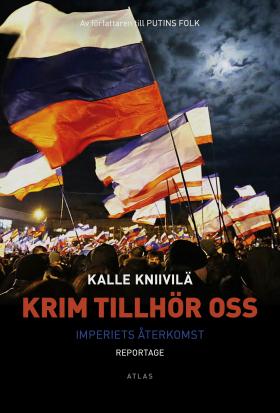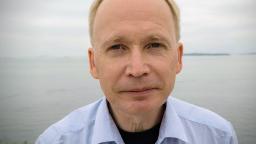
Krim tillhör oss: imperiets återkomst
(The Crimea is Ours: the Empire Returns)
by Kalle Kniivilä
reviewed by Fiona Graham
‘Of course, Stalin wasn’t as perfect as Putin’, says Tatiana Fominych, head of the Anatomical Institute in the Crimean capital of Simferopol. Visiting the Crimea in the early autumn of 2014, Kniivilä finds many who share her enthusiasm for the president and his attempt to restore great power status to Russia. The many who deplore the Russian takeover of the peninsula – who are often given false names in this reportage – have to be rather more circumspect about how they express themselves.
In his travels around the annexed region and on a subsequent visit to Kiev, Kniivilä meets an extraordinary variety of Crimeans – and ex-Crimeans.There are the people of a certain age who,nostalgic for a rose-tinted Soviet past that never existed, welcome the ‘reunification’ as a restoration of ‘historical justice’. There are the proud citizens of Sevastopol, home to the Black Sea fleet and ‘city of Russian honour’. And there are the liberals who value the freedom of speech and association they enjoyed under Ukrainian rule, many of them Crimean Tatars who have every reason to fear the return of a repressive regime.
Kniivilä’s conversations with these contrasting characters provide fascinating insights into the unfolding crisis. We meet courageous journalists like Yelena Mechanik, whose team was brutalised by unidentifiable men after filming an attack on a Ukrainian military installation, after which she and her family fled to Kiev. Following the occupation of the Crimean parliament and the international airport by ‘polite men’ in unmarked green uniforms, a propaganda war was waged to secure the annexed territory. Many Russian- speakers were apparently convinced that Ukraine had fallen to a fascist junta after President Yanukovych’s flight. Yefim, an elderly Esperantist who seems to have conserved his critical faculties in other respects, believes that Ukrainian rightists massacred a busload of Crimeans in the ‘Korsun pogrom’. A representative of the Tatar TV channel ATV (now closed down) speaks of the words whose use on air is ‘discouraged’: occupation, annexation, house searches. Instead, he is advised to speak of ‘reunification’ and ‘inspections’.
As in Putins folk, Kniivilä reveals outstanding abilities both as an interviewer and as a political and social analyst. He listens politely and understandingly to the most outrageous diatribes, but makes his critical stance clear to his interlocutors, as well as to his readers. Passages quoted verbatim are accompanied by Kniivilä’s corrective comments, enabling readers who lack in-depth knowledge of Russia, Ukraine and the Crimea to see through the results of propaganda and misinformation. Perhaps the most pernicious instance of brainwashing is the ‘re-education’ of children after the Russian takeover. A Tatar child, traumatised after a day at school, asks his mother, ‘Who’s telling lies? You say Ukrainians are nice people, but today we learned they’re fascists and murderers.’ The Crimea is Ours is a riveting account of an event which may yet be seen as a turning-point in European post-war history, making the future unpredictable. It is remarkable both in its analytical acuity and in the way it captures how Crimeans’ lives have been turned upside down overnight. To quote another Tatar, a member of the native Crimean minority once exiled to Soviet Central Asia by Stalin, ‘it feels as if someone has come and pulled another country over my head, like a sweater.’

Krim tillhör oss: imperiets återkomst
Atlas, 2015. 267 pages.
